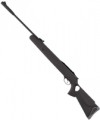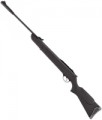The type of mount for mounting sights provided in the design of the rifle. Most often in such cases we are talking about an optical or collimator sight; and the most popular mounting options are
Weaver/Picatinny rail and
dovetail. Here are their features:
— "Dovetail". This type of mount has a cross-sectional view of an inverted trapezoid (expanding upwards); the clamp on the sight covers this trapezoid from two sides, and the transverse cutouts, unlike the Weaver / Picatinny rails, are not provided for in the design — fixing in place is carried out in other ways. Dovetail mounts were originally used in civilian hunting rifles, as well as in Soviet-style military weapons. Nowadays, due to their simplicity, low cost and versatility, they are extremely common in air rifles. In addition, we note that you can even install a Weaver / Picatinny rail on a dovetail (such rails are available separately) and use a sight with the appropriate type of mount.
— Weaver / Picatinny rail. Fastening in the form of a bar with a T-shaped profile and characteristic transverse slots — they serve to rigidly fix the installed accessories in one place. Technically, Weaver and Picatinny rails are different types of mounts, they differ in the size of the slots; these differences are such that the sights and other “body kit” for the Weaver rails easily get on the Picatinny rail, but the opposite option is far fro
...m always possible. However, in the civilian market, most weapon accessories for such slats are made specifically for the weaver, so this nuance, most often, is not fundamental, and both types of slats are combined into one category.
In general, for a number of reasons, such straps are much less common in air rifles than the dovetail. At the same time, classic pneumatics are most often equipped with Weaver mounts, but in airsoft copies of real weapons, Picatinny rails (or compatible NATO STANAG 4694 rails, also known as RIS 22 mm) can also be used.
— Is absent. The absence of any standard mounts for the sight in the design of the rifle. Most often, this designation means that the rifle is equipped with a classic front sight with a whole and does not require the installation of additional sights. However, there is also a more specific option — pneumatics, in which original mounts are used to install optics or a collimator, which are not related to the standards described above. Such rifles can be supplied with or without scopes; there are even models with non-removable optics, although extremely rare.—
Tree. A classic material used in firearms and then pneumatic weapons since ancient times (in fact, since its inception). Wooden stocks are strong enough on their own, and in modern rifles they are also amenable to special treatment to protect against dampness, temperature changes, etc .; while the rifles have a nice appearance in a classic style. At the same time, the wood is prone to abrasion, scratches easily appear on it, and there is a possibility of cracks. When used in simple conditions, such as periodic "shooting" in the country, this does not matter, however, for example, a wooden stock is not suitable for hunting — at least because it will quickly lose its "presentation". At the same time, this material is also somewhat more expensive and more difficult to process than plastic that is more resistant to “troubles”. Therefore, today the tree is used mainly in pneumatics of the middle and upper price range and is designed for those who are primarily interested in the aesthetics of weapons.
—
Plastic. One of the most popular materials for the manufacture of modern pneumatics. Such stocks are easy to manufacture and inexpensive, while the plastic can be given a rather complex shape without any problems, which, in particular, facilitates the installation of various adjustment systems (see “Cheek Adjustment”, “Butt / Stock Adjustment”). However, its main advantage is practicality: this materia
...l is resistant to impacts, cracks and scratches, comparable in strength to wood (or even superior) and has a small weight. As a result, plastic has become widespread in almost all price ranges.
— Aluminium. A fairly advanced material that combines low weight and high strength. On the other hand, aluminium stocks for classic pneumatics are generally expensive, and therefore are used mainly in high-end professional models (although there are exceptions). But in airsoft rifles that copy real weapons, the situation is somewhat different: there aluminium can be used as a simpler and more affordable alternative to steel (from which gunshot prototypes are made).
